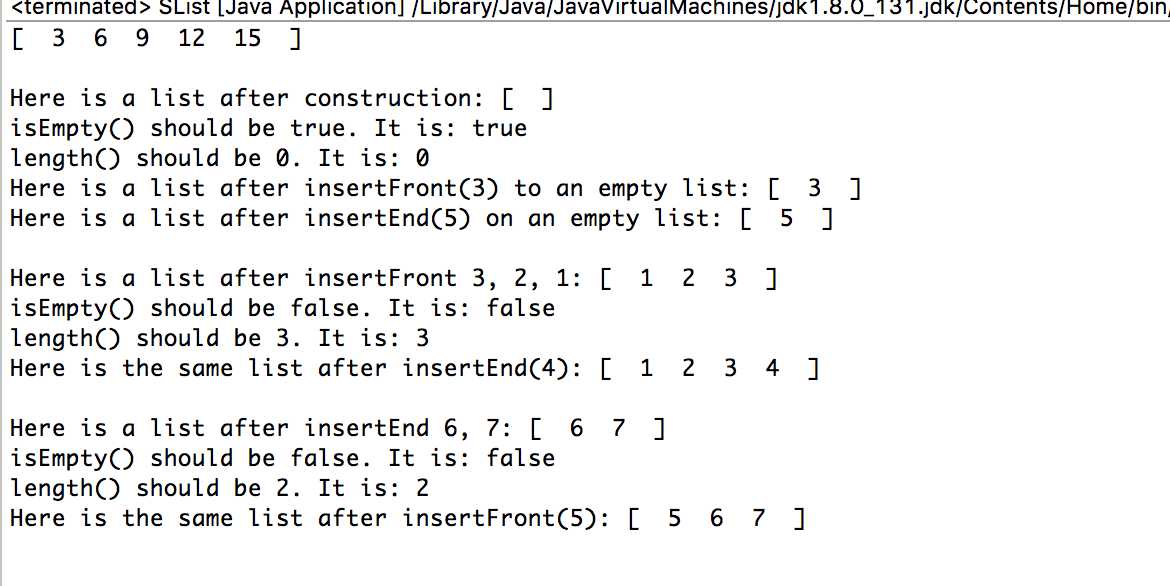标签:system pen oid action front tostring view rac param

/* SList.java */ /** * The SList class is a singly-linked implementation of the linked list * abstraction. SLists are mutable data structures, which can grow at either * end. * * @author Kathy Yelick and Jonathan Shewchuk **/ public class SList { private SListNode head; private SListNode tail; private int size; /** * SList() constructs an empty list. **/ public SList() { size = 0; head = null; tail=null; } /** * isEmpty() indicates whether the list is empty. * @return true if the list is empty, false otherwise. **/ public boolean isEmpty() { return size == 0; } /** * length() returns the length of this list. * @return the length of this list. **/ public int length() { return size; } /** * insertFront() inserts item "obj" at the beginning of this list. * @param obj the item to be inserted. **/ public void insertFront(Object obj) { head = new SListNode(obj, head); size++; if(size==1){tail=head; } } /** * insertEnd() inserts item "obj" at the end of this list. * @param obj the item to be inserted. **/ public void insertEnd(Object obj) { if (tail == null) { insertFront(obj); } else { tail.next=new SListNode(obj,null); tail=tail.next; size++;} } /** * nth() returns the item at the specified position. If position < 1 or * position > this.length(), null is returned. Otherwise, the item at * position "position" is returned. The list does not change. * @param position the desired position, from 1 to length(), in the list. * @return the item at the given position in the list. **/ public Object nth(int position) { SListNode currentNode; if ((position < 1) || (head == null)) { return null; } else { currentNode = head; while (position > 1) { currentNode = currentNode.next; if (currentNode == null) { return null; } position--; } return currentNode.item; } } /** * toString() converts the list to a String. * @return a String representation of the list. **/ public String toString() { int i; Object obj; String result = "[ "; SListNode cur = head; while (cur != null) { obj = cur.item; result = result + obj.toString() + " "; cur = cur.next; } result = result + "]"; return result; } /** * main() runs test cases on the SList class. Prints summary * information on basic operations and halts with an error (and a stack * trace) if any of the tests fail. **/ public static void main (String[] args) { SList a=new SList(); a.insertFront(12); a.insertFront(9); a.insertFront(6); a.insertFront(3); a.insertEnd(15); System.out.println(a.toString()); // Fill in your solution for Part I here. testEmpty(); testAfterInsertFront(); testAfterInsertEnd(); } /** * testEmpty() tests toString(), isEmpty(), length(), insertFront(), and * insertEnd() on an empty list. Prints summary information of the tests * and halts the program if errors are detected. **/ private static void testEmpty() { SList lst1 = new SList(); SList lst2 = new SList(); System.out.println(); System.out.println("Here is a list after construction: " + lst1.toString()); TestHelper.verify(lst1.toString().equals("[ ]"), "toString on newly constructed list failed"); System.out.println("isEmpty() should be true. It is: " + lst1.isEmpty()); TestHelper.verify(lst1.isEmpty() == true, "isEmpty() on newly constructed list failed"); System.out.println("length() should be 0. It is: " + lst1.length()); TestHelper.verify(lst1.length() == 0, "length on newly constructed list failed"); lst1.insertFront(new Integer(3)); System.out.println("Here is a list after insertFront(3) to an empty list: " + lst1.toString()); TestHelper.verify(lst1.toString().equals("[ 3 ]"), "InsertFront on empty list failed"); lst2.insertEnd(new Integer(5)); System.out.println("Here is a list after insertEnd(5) on an empty list: " + lst2.toString()); TestHelper.verify(lst2.toString().equals("[ 5 ]"), "insertEnd on empty list failed"); } /** * testAfterInsertFront() tests toString(), isEmpty(), length(), * insertFront(), and insertEnd() after insertFront(). Prints summary * information of the tests and halts the program if errors are detected. **/ private static void testAfterInsertFront() { SList lst1 = new SList(); lst1.insertFront(new Integer(3)); lst1.insertFront(new Integer(2)); lst1.insertFront(new Integer(1)); System.out.println(); System.out.println("Here is a list after insertFront 3, 2, 1: " + lst1.toString()); TestHelper.verify(lst1.toString().equals("[ 1 2 3 ]"), "InsertFronts on non-empty list failed"); System.out.println("isEmpty() should be false. It is: " + lst1.isEmpty()); TestHelper.verify(lst1.isEmpty() == false, "isEmpty() after insertFront failed"); System.out.println("length() should be 3. It is: " + lst1.length()); TestHelper.verify(lst1.length() == 3, "length() after insertFront failed"); lst1.insertEnd(new Integer(4)); System.out.println("Here is the same list after insertEnd(4): " + lst1.toString()); TestHelper.verify(lst1.toString().equals("[ 1 2 3 4 ]"), "insertEnd on non-empty list failed"); } /** * testAfterInsertEnd() tests toString(), isEmpty(), length(), * insertFront(), and insertEnd() after insertEnd(). Prints summary * information of the tests and halts the program if errors are detected. **/ private static void testAfterInsertEnd() { SList lst1 = new SList(); lst1.insertEnd(new Integer(6)); lst1.insertEnd(new Integer(7)); System.out.println(); System.out.println("Here is a list after insertEnd 6, 7: " + lst1.toString()); System.out.println("isEmpty() should be false. It is: " + lst1.isEmpty()); TestHelper.verify(lst1.isEmpty() == false, "isEmpty() after insertEnd failed"); System.out.println("length() should be 2. It is: " + lst1.length()); TestHelper.verify(lst1.length() == 2, "length() after insertEndfailed"); lst1.insertFront(new Integer(5)); System.out.println("Here is the same list after insertFront(5): " + lst1.toString()); TestHelper.verify(lst1.toString().equals("[ 5 6 7 ]"), "insertFront after insertEnd failed"); } }
运行结果

标签:system pen oid action front tostring view rac param
原文地址:http://www.cnblogs.com/Jingjunw/p/7222241.html